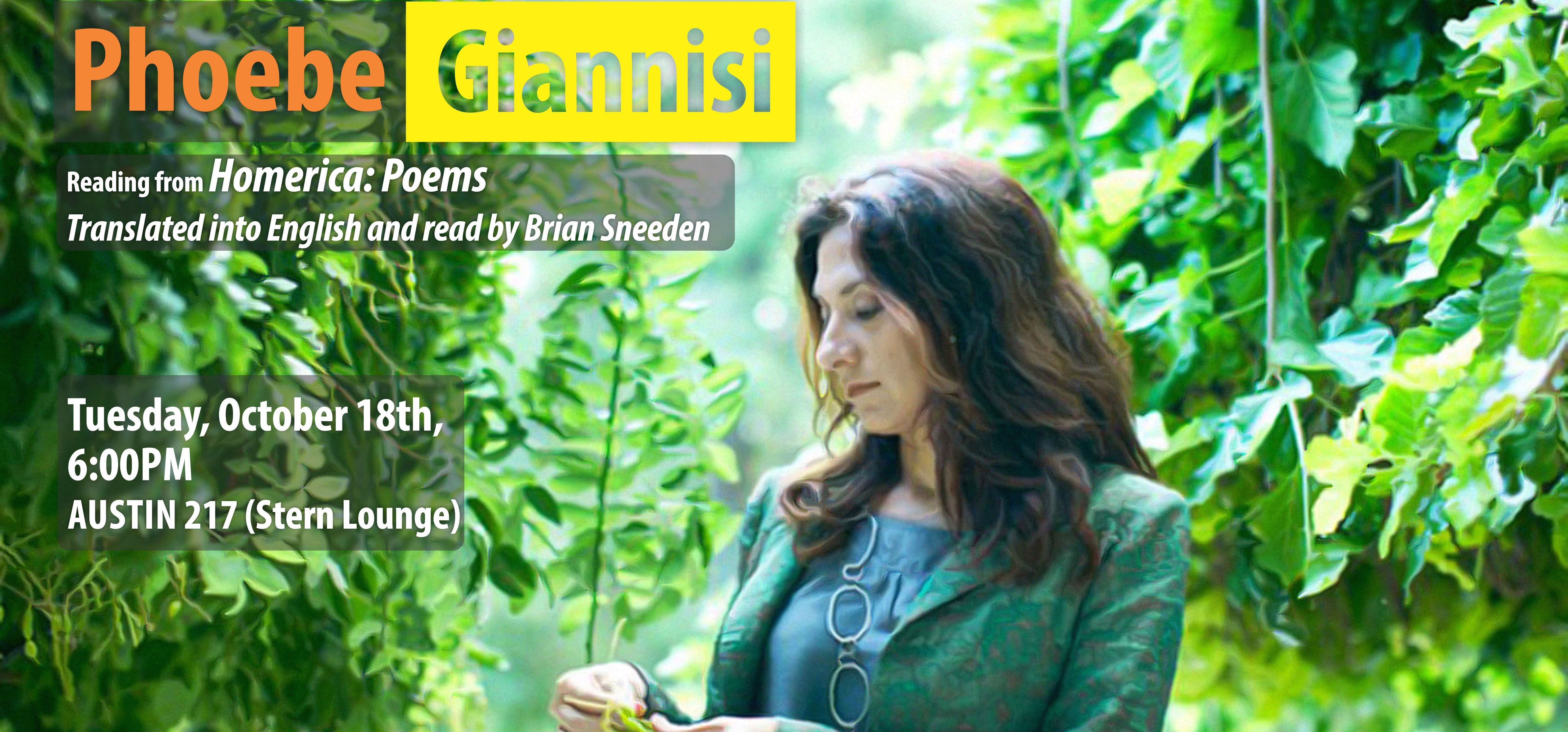 On October 18th internationally renowned Greek-poet Phoebe Giannisi came to UConn to offer a reading of her dramatic performance of poetry. The event was co-organized by the Literary Translation Program, launched by LCL Professor Peter Constantine, and the Creative Writing Program. Giannisi presented various poems of her book Homerica in Greek, while her translator, the UConn Ph.D. student in English and Literary Translation Studies, Brian Sneeden, read them in English. Many of Giannisi’s poems evoke or are named after Classical Greek mythological figures such as Achilles, Penelope and Orpheus. Among the highlights of her performance was her original piece Tettix (‘Cicada’ in Ancient Greek), which talks about erotic desire, poetry, melody inspiration, metamorphosis, and death. While writing the poems, Giannisi described her care for how the poem would be heard rhythmically, at the border of song and reading. Since Homeric poetry was recited by heart with very strong rhythmic patterns, she thought of making a DVD that would accompany her book. In this way, while listening to the poems, the audience could see the locations where the poems were recorded in Mount Pelion in Greece, creating a compelling audiovisual experience that captured the special atmosphere of each place. Tettix is one of Giannisi’s most successful works and was exhibited in the National Museum of Contemporary Art in Athens.
On October 18th internationally renowned Greek-poet Phoebe Giannisi came to UConn to offer a reading of her dramatic performance of poetry. The event was co-organized by the Literary Translation Program, launched by LCL Professor Peter Constantine, and the Creative Writing Program. Giannisi presented various poems of her book Homerica in Greek, while her translator, the UConn Ph.D. student in English and Literary Translation Studies, Brian Sneeden, read them in English. Many of Giannisi’s poems evoke or are named after Classical Greek mythological figures such as Achilles, Penelope and Orpheus. Among the highlights of her performance was her original piece Tettix (‘Cicada’ in Ancient Greek), which talks about erotic desire, poetry, melody inspiration, metamorphosis, and death. While writing the poems, Giannisi described her care for how the poem would be heard rhythmically, at the border of song and reading. Since Homeric poetry was recited by heart with very strong rhythmic patterns, she thought of making a DVD that would accompany her book. In this way, while listening to the poems, the audience could see the locations where the poems were recorded in Mount Pelion in Greece, creating a compelling audiovisual experience that captured the special atmosphere of each place. Tettix is one of Giannisi’s most successful works and was exhibited in the National Museum of Contemporary Art in Athens.
Trained in Architecture and Classics, Giannisi is an Associate Professor at the University of Thessaly in Greece and co-edits FRMK, a biannual journal of poetry, poetics, and visual arts. She has published five books of poetry and her poems present a spectacular range of styles covering three millennia of Greek history. She has a distinctive approach to poetry, as something “that comes out of the body and connects with the orality and musicality of language without following strict rules.” Her poems are written in a fusion of languages including Ancient and Modern Greek and local Greek dialects. Giannisi’s work lies between poetry performance, theory and installation, and explores the connections between language, voice, and writing with body, place, and memory. Brian Sneeden describes translating her poems as “a transformative experience.” He commented that “Phoebe Giannisi’s poems require a certain capacity for surrender – both in terms of how one experiences language and its perceived boundaries, but also in regards to the boundaries of English, which does not draw quite as easily as Greek from a vocabulary steeped in so ancient a history.”
For more information about her poetry, visit Giannisi’s website: phoebegiannisi.net